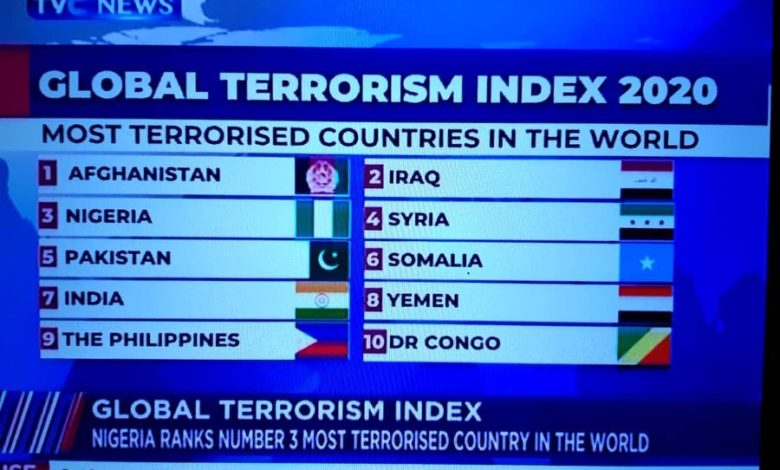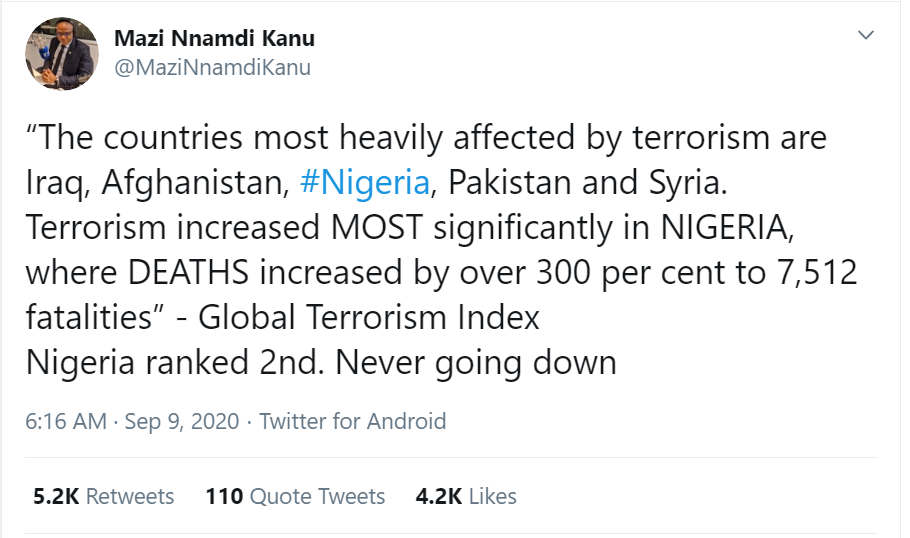Factcheck: Nigeria Not Ranked Third Most Terrorised Country In 2020

Television Continental (TVC), a channel based in Lagos, claimed last week that Nigeria is ranked as the worst country in the world according to the 2020 Global Terrorism Index.
This statement is, however, false and misleading because, as findings showed, the latest Global Terrorism Index report released was that of 2019.
Full text
During one of its programmes, Journalists Hangout, aired on Thursday, September 10, TVC reported that Nigeria “emerges the most terrorist country in Africa, ranked worse than Syria, Yemen, Somalia, and Pakistan”.
“Nigeria now ranks third among the most terrorised countries in the world according to the latest report by the Global Terrorism Index,” said Ayodele Ozugbakun, the programme host.
About six minutes into the show, an infographic was shown titled “Global Terrorism Index 2020” with a list of the countries ranked first and 10th most terrorised globally.
This infographic has been shared multiple times across social media in the country. Between Thursday and Sunday, it was especially posted by various accounts on Twitter, a widely used microblogging platform in Nigeria.
One of those tweets was liked by 745 users as of Monday and shared over 700 times, and a second one was liked 149 times and shared by 314 users.
A number of blogs and news websites have also echoed the claim. “Earlier this morning, The Television Continental (TVC) released the global terrorism index among the countries of the world for the year 2020,” Opera News stated on Sunday.
“According to the global terrorism index for the year 2019 and comparing it with the year 2020s index, one can see that nothing really changed in the rankings, the same Afghanistan that topped the index last year is it the same country that is topping it this year why Nigeria maintained its third position,” the platform added.
HumAngle texted and emailed TVC on Monday for clarification but is yet to receive any response.
Verification
Published every year since 2012 by the Institute for Economics and Peace (IEP), the Global Terrorism Index (GTI) “provides a comprehensive summary of the key global trends and patterns in terrorism.” The index is based on statistics collected in the Global Terrorism Database (GTD) and other sources.
IEP publishes the report in the last quarter of the year through its online data-centred platform, Vision of Humanity. A visit to the website on Monday, September 14, revealed that the latest GTI is the one released in November 2019.
The institute’s main website also does not have a GTI report for 2020, and has only published the Global Peace Index for this year.
The 2017 and 2018 reports were respectively released in November and December. IEP has also confirmed in multiple messages sent to HumAngle that the 2020 index has not been published. “It will be released in November 2020 on a date still to be confirmed,” the institute replied in an email.
A Twitter account belonging to the leader of the Indigenous People of Biafra, Nnamdi Kanu, claimed on September 9 that Nigeria ranked second in the world, but this is not true. (The tweet was retweeted over 5,000 times and liked by over 4,200 users.)
The report ranked Nigeria as the third-worst among a total of 163 countries, behind Afghanistan and Iraq. Trailing after the country were Syria, Pakistan, Somalia, India, Yemen, Philippines, and D.R. Congoㅡ as reported by TVC.
Kanu quoted the GTI as stating that “the countries most heavily affected by terrorism are Iraq, Afghanistan, #Nigeria, Pakistan and Syria. Terrorism increased most significantly in Nigeria, where deaths increased by over 300 per cent to 7,512 fatalities”.
However, the latest report neither claimed that terrorism increased “most significantly in Nigeria” nor that deaths increased by over 300 per cent. Rather, what it states is that “deaths from terrorism in Nigeria rose to 2,040 in 2018, a 33 per cent increase.”
It should be noted that while Nigeria has been ranked third-worst country on the index since 2015 when Boko Haram terrorists attacked and occupied vast areas in the Northeast, its performance has steadily improved.
The ranking makes use of a score determined by the number of incidents as well as the impact of terrorism on lives and properties in each country; and the higher it is, the worse. In 2014, when Nigeria was ranked 4th, its score was 8.58. In 2015, it rose to 9.213 and in 2016, it rose further to 9.314, but it has since started to drop. The score was 9.009 in 2017, 8.660 in 2018, and then 8.595 in 2019.
Conclusion
It is false to claim that Nigeria was ranked the third most terrorised country in the world by the Global Terrorism Index of 2020 because no such report has been released at this time as confirmed by the Institute for Economics and Peace itself.
The researcher produced this fact-check per the Dubawa 2020 Fellowship partnership with HumAngle to facilitate the ethos of “truth” in journalism and enhance media literacy in the country.
Support Our Journalism
There are millions of ordinary people affected by conflict in Africa whose stories are missing in the mainstream media. HumAngle is determined to tell those challenging and under-reported stories, hoping that the people impacted by these conflicts will find the safety and security they deserve.
To ensure that we continue to provide public service coverage, we have a small favour to ask you. We want you to be part of our journalistic endeavour by contributing a token to us.
Your donation will further promote a robust, free, and independent media.
Donate HereStay Closer To The Stories That Matter





